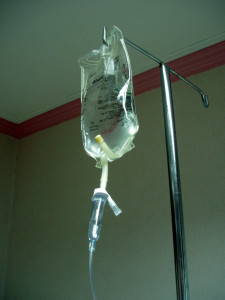We’re all given the discharge instructions from the hospital after we’ve had a baby regarding pain relief, prenatal vitamins, infant care, how to care for any incisions we’ve had, bleeding, breastfeeding, diet and nutrition, activity, emotional changes and the always important list of ‘When To Call Your Doctor’.
When To Call Your Doctor. If you’re having an extended period of sadness. Fever. Painful, swollen incision. Excessive vaginal bleeding. A recurrence of bright red vaginal bleeding after it’s changed to a lighter brown/pink/rust color.
I briefly glanced over these papers after having each of my babies, but tossed ’em right into the trash upon returning home — particularly with my second daughter. I’ve had two uneventful pregnancies and births and one very uneventful postpartum recovery with my first daughter. I wasn’t even a little bit worried about recovery when I was discharged with my second daughter. Besides being a little sore (that extra pound of baby made a difference!), I actually felt better and more normal faster the second time around then I did the first.
At a week and a half postpartum, I woke up with what felt like a leaky pad. I climbed out of bed and shuffled my way to the bathroom, noticing that it felt like I was continuously losing blood. When I turned on the bathroom lights, I realized that I was continuously losing blood. And a lot of it. The bright red blood with clots that they warn you about before you leave the hospital. The scary kind that I didn’t even see 24 hours postpartum and definitely shouldn’t have been seeing a week and a half later. The bottom half of my body was essentially covered in blood and it wasn’t showing any signs of stopping. I managed to get my pad changed, myself cleaned up the best I could, and a yell to my husband for help before I started seeing spots and almost hit the floor.
My husband got me into bed and asked if we should call the doctor. Even with what I described above, I honestly wasn’t sure. I told him that I didn’t want to be the overly dramatic patient heading into the hospital for something that was maybe normal. I just wasn’t sure.
Two hours later, I managed to climb out of bed with the same results (and then straight back into bed), so we left a message for the doctor with a promise that she’d call us back as soon as possible. Two hours after that phone call I was feeling a little more normal after a light lunch, so I thought I’d try a shower. Before I could even get undressed, the gushing blood and faintness started again, so we made the decision to just head to labor and delivery despite not having talked to the doctor.
I spent a few hours in the hospital with no definitive answers as to why I was bleeding so heavily. I was given medications in the hospital and a prescription for 3-days worth of another medication to take at home before I was released. The bleeding returned to normal, but I was nervous that it would start again after the medicine ran out.
 Sure enough, 3 days later I started to bleed heavily again — soaking thick overnight pads pretty much as fast as I could change them. This time, we didn’t wait. We spoke to a doctor right away and headed straight to the hospital for a second time. After my second postpartum internal exam in 3 days (let me tell you how much fun THOSE were), my doctor suggested the possibility that some placenta had been left behind after delivery and decided to do a D&C.
Sure enough, 3 days later I started to bleed heavily again — soaking thick overnight pads pretty much as fast as I could change them. This time, we didn’t wait. We spoke to a doctor right away and headed straight to the hospital for a second time. After my second postpartum internal exam in 3 days (let me tell you how much fun THOSE were), my doctor suggested the possibility that some placenta had been left behind after delivery and decided to do a D&C.
The D&C, along with another round of medication, did successfully stop the heavy bleeding, and I’m pretty much back to normal two weeks later. I’m glad I took the risk of being the overly dramatic patient because it’s unlikely that the bleeding would have just stopped on its own had I tried to wait it out at home.
If you’re newly postpartum — or even weeks out from delivery — and it seems like too much blood, trust your gut and call your doctor or just head in. The best that can happen is that you feel like an idiot. The worst is not something that I like to consider.
Signs that your postpartum bleeding might warrant a call to your doctor:
- The blood is still bright red four days after your baby’s birth
- The blood has a foul smell or you come down with a fever or chills
- Bleeding is abnormally heavy (especially if it’s already slowed down); soaking a pad in an hour or passing blood clots bigger than a golf ball.








